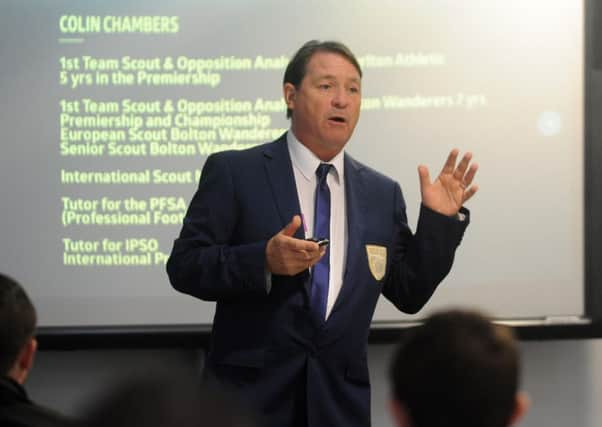Football’s spy school breeding a new generation of scouts


They watch anonymously from the shadows, looking to unearth the lucky few who can realistically be expected to find their way into the Premier League. In the public eye, scouts are dream-makers.
Cracked open by Michael Calvin in 2014’s The Nowhere Men, the true perspective of life as a scout is much different.
Advertisement
Hide AdAdvertisement
Hide AdIt is a world of low-pay and a lack of respect, one in which the spectre of analytics threatens livelihoods as top sides cut back on using those regarded as expert spotters in favour of cold, hard numbers.


However, clubs have started to tailor traditional scouting to modern methods, and that was reflected at the International Professional Scouting Organisation (IPSO) course held at Kirklees College in Huddersfield, following on from past courses in Poland.
Colin Chambers, a scout who worked for Bolton and Charlton when they were in the Premier League, is trying to breed a new generation of scouts as well as offering guidance to those already in the industry about how they can improve their craft.
Data, analytics, and old-fashioned game watching are brought together, and taught as aspects of the complete package of scouting.
Advertisement
Hide AdAdvertisement
Hide AdIt was the right view to take, according to many of those involved in the game who sat in the room to survey the course.
A then-employee of Huddersfield Town said: “We use Scout7, Wyscout, we have Opta and Prozone, but we still have a commitment to live scouting.”
How do you teach live scouting within the confines of a classroom, given how important a tool it is in a scout’s locker?
Simply put, you do not.
The first day involved a run through the basics, such as how to put together a good match report based on the taped performance of Serey Die, who was playing for FC Basel.
Advertisement
Hide AdAdvertisement
Hide AdStudents had to follow closely his movement, his play and his positional awareness and decide whether he was worth considering as a signing.
Chambers concluded that he was not good enough, but welcomed debate. In the end, he said: “It’s all about opinions, but getting the right ones.”
That fed into the work on the second day, an exercise at a Huddersfield Town game.
Rather than being limited by the footage, which had only shown Die when he was in camera shot, watching a game live allows you to track a player every second he is on the pitch, making judgments more accurate. It is a valuable skill.
Advertisement
Hide AdAdvertisement
Hide AdIt allowed those who were trying scouting for the first time from an amateur perspective to view football in an alternative light.
Often ex-players are picked up by a club to scout upcoming opposition, noting their set-piece routines, which was covered the following week over another two-day period.
It was something of a shock to find out that even for those who have played the game, there seems to be a lack of understanding over the difference between football from a coaching perspective and from a scouting one.
Kevin Gallacher, who played for Blackburn Rovers and Newcastle United in the Premier League and regularly works as a pundit on radio and television, has attended three IPSO courses, and says that they have improved how he watches the game.
Advertisement
Hide AdAdvertisement
Hide AdHe said: “I wouldn’t say it’s changed it, I’d say it’s enhanced it. We kind of know the game anyway when we’re looking at the game as coaches, knowing how the players work individually and collectively in a team.
“It’s just purely the attention to detail that scouts put into it that make it. I’ve seen one report where a scout said about a player that ‘he was quick, but he was slow, but he was really quick, but one-paced’. I thought ‘it does not make sense that’, so you’ve got to get the wording right.
“When I was introduced to the IPSO stuff, it really opened my eyes and made it better.”
Gallacher’s words reflect the fact that players almost immediately assume that scouting is an easy option when they find themselves heading towards retirement. That is not the case, according to Chambers.
Advertisement
Hide AdAdvertisement
Hide AdIt is a tough industry, he makes clear, one in which “if I’m working for Hull and my chief scout asks me about a player at Bury Under-18s, I need to know”.
It is a 365-days-a-year job and the course shows that it’s not just about having an ‘eye’ for a player. There are specialist skills that need to be developed. You need to know whether a player is positionally good, talented and able, and that involves watching the game completely differently.
It opened up my eyes, and after dipping a toe in the scouting waters, I went back to the day job, which admittedly involves more football than most. Filled with confidence by IPSO’s lessons, I found myself discussing a player with a Football League manager at a game.
It appeared a good time to put the new-found skills to the test.
Advertisement
Hide AdAdvertisement
Hide AdI suggested the player in question looked “decent”. He then spent the next 45 minutes miscontrolling every pass played into him, something the manager was happy to point out.
It might be time for a refresher.
The next ISPO course will be held on January 11, 12, 18 and 19 at Kirklees College. Visit www.ipsofootball.com for more information.